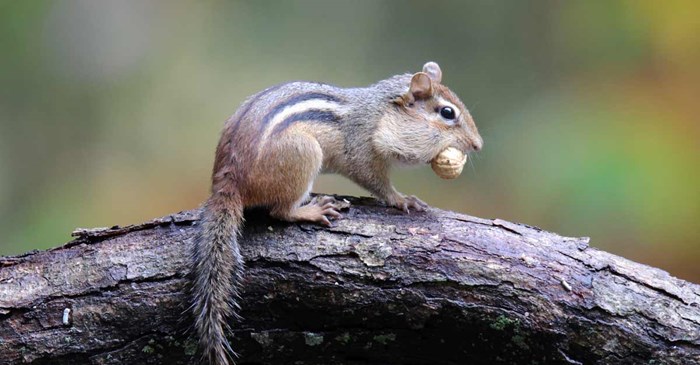Is it a good idea to feed bread, corn, and dinner scraps to the furry creatures that visit our backyards?
First, processed foods that are prepared for humans will just fill them up with empty calories. These empty calories can keep them from seeking out foods from natural sources. At the same time, their diets need variety, so they can get the high-quality proteins, fats and nutrients their bodies need to stay healthy.
When you’re supplementing the diets of wildlife, a balanced approach is best. Start with thinking about what your favorite critters like to eat in the wild. So when you share a snack with the chipmunks, squirrels, deer and rabbits, you'll choose the right foods that meet their needs.
What do chipmunks like to eat?
Chipmunks eat a wide variety of proteins, grains, fruits and veggies, including insects, mealworms, seeds, nuts and berries. They live in small burrows where they can store up to eight pounds of seeds, grains and nuts. Doing this lets them have the ready supply of fat, nutrients and calories they need to survive the winter.
What do squirrels like to eat?
One thing we love to offer the squirrels is a sample of our snacks. Peanuts, for example, get squirrels scampering over for a bite every time. But keep in mind, the excess salt can be taxing on their small bodies, as their kidneys work overtime to filter out the sodium. That’s one reason to resist feeding the animals foods that are prepared and seasoned for human consumption.
What do deer eat?
Deer are foragers, living off leaves, flowering plants, nuts, seeds, berries and grasses they come across in their habitat. They’ll also nibble on agricultural crops when they can access them to get the goodness of grains. Given this wide range of foods, it just goes to show how much deer rely on variety to get the nutrients their bodies need.
What do rabbits eat?
Rabbits will eagerly consume ears of dried corn you set out for the wildlife. Though corn is a great source of complex carbohydrates to give them energy, a bunny diet also needs a high volume of fiber and roughage to make their systems run smoothly. If they fill their bellies with corn, processed breads and other "treats," that can lead to digestive issues.
When you're sharing the bounty with the backyard creatures, Lyric Wildlife Food provides the perfect balanced blend. In addition to corn, it also has black oil sunflower seeds, red milo, peanuts, green peas and whole oats that tempt their palates and nourish their bodies.
